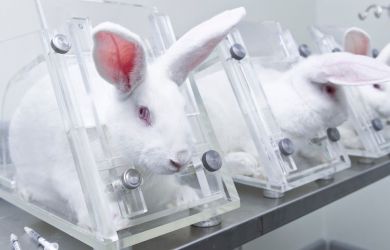
August 19, 2010
AV Against AIDS
Japanese porn stars fight HIV infection with a 24-hour telethon
By Metropolis
Originally published on metropolis.co.jp on August 2010

Courtesy of Paradise TV

Courtesy of Paradise TV

Courtesy of Paradise TV

Photo by Brett Bull

Photo by Brett Bull

Photo by Brett Bull
Very few company presidents could sit in a conference room and casually explain why they’re about to allow the general public to enter their corporate headquarters and fondle the breasts of female staff for a modest donation to charity. Yet Tsuyoshi Shiba, chief of provocative porn channel Paradise TV, is one of them.
“By simply broadcasting our programs, that is one way to interact with society,” says the soft-spoken 60-year-old from beneath a billowing mane of dark hair. “But we wanted a more direct interaction with our viewers so that we can better distinguish ourselves.”
The use of “direct” might be the understatement of the year.
Over the last weekend of August, viewers are invited to the Shinjuku studio of Paradise TV to grasp the exposed chests of five female staffers who anchor the channel’s naked news programs (yes, the segments are exactly as revealing as that description implies). The suggested donation of ¥1,000 will be used to help prevent the spread of AIDS, a crisis that continues to worsen in Japan.
Now in its eighth year, the 24-Hour TV: Eroticism Saves the Earth telethon, broadcast live on satellite provider Sky PerfecTV!, raises around ¥2 million annually. But the numerical figure is not important, Shiba says; the show is about the message. “When we started, AIDS was still being widely discussed. However, the issue began to slowly fade from view. So I’ve felt that this drive must continue in the hope that awareness of the problem will not be lost.”
Other events aimed at getting viewers to tune in include a “strip” mahjong exhibition, where porn actresses compete and slowly disrobe as the game progresses, and a masturbation “relay,” which involves multiple actresses manually stimulating themselves. Viewers will be able to watch the proceedings uninterrupted on the Paradise TV website and for shorter periods on the regular live telecast.
Many of the garments worn by the female participants will be auctioned off to the highest bidder. During past telethons, it’s not been unusual for the bras and underpants of popular actresses to fetch upwards of ¥50,000, with perhaps a signed DVD or poster thrown in for good measure.
Humor, too, is part of the attraction. In true Paradise TV fashion, the girls baring their bosoms are known as OKB24, a reference to mega-selling idol group AKB48. “OKB” is short for oppai monde kansha kangeki bokin shite kurete arigato, roughly “donate and take a satisfying breast squeeze.” Likewise, the “Eroticism Saves the Earth” moniker takes a shot at Nippon Television’s simultaneous telethon “Love Saves the Earth,” a 30-year-old, celebrity-filled event that annually raises about ¥1 billion for causes related to the environment.
Some people might argue that, given the seriousness of the AIDS crisis, such frivolity is in bad taste. But Paradise TV, which has made its name by broadcasting erotic shows featuring bathroom peeping, lactating mothers and women who engage in frequent extramarital affairs, sees it as the only way. “Our viewers expect a comedic approach from us,” explains Shiba. “We can’t change that. This is our way of allowing for the issue to be discussed.”
Yet should the entertainment element overshadow the message, guests arriving at the studio will see no shortage of the campaign’s graphic, created by artist Tetsuya Koshiba and found on pink T-shirts and posters. It shows a curvy, long-haired girl waving a wrapped condom above the exclamation “Stop! AIDS.” Boxes of condoms and bracelets carrying prevention mottos will be readily available for distribution as well.
Over the last decade and a half, the number of reported HIV infections and AIDS cases in Japan has been steadily increasing. Although the health ministry reported that new cases of HIV and AIDS in 2009 (1,021 and 431, respectively) had actually fallen compared to 2008, the figures are misleading, according to the Japan Foundation for AIDS Prevention (JFAP), which supports the Paradise TV drive.
Yasushi Sawazaki, director of the JFAP’s program operation section, says that the outbreak of H1N1—a.k.a. “swine flu”—drained the resources of many health centers around the country last summer, when HIV-testing campaigns are typically held. “The reported number of new detections was reduced,” Sawazaki says from the foundation’s offices in Chiyoda Ward. “But that doesn’t mean that there’s been a real decline.”
For its part, Paradise TV requires actors to wear condoms during regular filming—even if that means losing some of the spontaneity for which the channel is known. “It’s a must,” says Shiba.
The JFAP spends much of its resources in the gay community. Last year, a majority of new HIV infections were the result of men having sex with men. Community Center Akta, which opened in 2004 through funding from the JFAP, is a drop-in office that provides safe-sex advice in the Shinjuku Ni-chome neighborhood.
Shiba admits that the gay population is not a target audience for Paradise TV, but argues that a broader perspective is best. “Some people get HIV from a blood transfusion,” he says. “It is also possible for a baby in the uterus to be infected by a mother who has HIV. So we don’t want to target any single population. Instead, we are looking at the whole picture.”
Shiba would like to continue with the event at least until it reaches its tenth year. After that, he’s not certain of the direction, only maintaining that expectations are high. “We wanted to make a connection, to transcend simple broadcasting with this event, and we have done that,” he says. “That was phase one. Our next mission is to cultivate something that will provide a similarly big jump.”
Sky PerfecTV! (channel 913) will broadcast “24-Hour TV: Eroticism Saves the Earth” from 7pm on Aug 28 until 8pm on Aug 29. “Boob Donation Time” takes place 6pm-3am on the 28th and 10am-6pm on the 29th. The Paradise TV offices are located at 5-12-4 Shinjuku. Nearest stn: Shinjuku, east exit.
Shinjuku Ni-chome
The risk of HIV infection stalks Tokyo’s gay enclave
Ko is a regular in Shinjuku’s gay quarter of Ni-chome, an area filled with roughly 300 bars, clubs, video stores and small hotels. Of slight build and sporting long, unkempt hair, the 23-year-old provides out-call S&M services, typically dispensed in love hotels or residences, to homosexual men. Bondage, whipping and humiliation are among his specialties.
During an interview at a coffee shop at the edge of Ni-chome, Ko explains that he always demands his clients use a condom if they request sexual contact. “And if I have to touch inside a customer, I’ll use rubber gloves,” he adds.
Yet many other Japanese men do not take such precautions—a fact that has made the gay community the largest growth population for cases of HIV and AIDS in Japan, according to the JFAP. The numbers speak for themselves: 70 percent of new HIV infections last year resulted from male homosexual contact.
An organization affiliated with the JFAP, Community Center Akta, operates out of a third-floor office in the heart of the area. “We established this center to actively work in the gay bars and the gay community in general,” says JFAP representative Yasushi Sawazaki. Their services include condom distribution and publishing the monthly newsletter Akta, which offers a guide to events and information on centers that provide HIV testing.
To be in Ni-chome is to see sex readily available, if not quite as openly marketed as it is for heterosexuals within the nearby red-light district of Kabukicho. On a recent visit, one young man in a pink shirt and smoking a cigarette in a nearby hallway could be seen by passersby vigorously rubbing his groin area—an obvious signal that he is available.
Though Sawazaki is encouraged that homosexual men have an awareness of the risk of HIV infection and are more apt than heterosexuals to get tested, Ko believes that the negative connotation associated with HIV causes it to remain a taboo subject.
“It’s a hidden word,” Ko says. “If I say ‘HIV,’ then people will think someone around me has HIV.”
For more info about The Akta Community Center, see www.rainbowring.org/akta.





